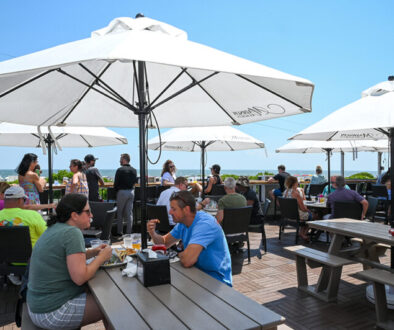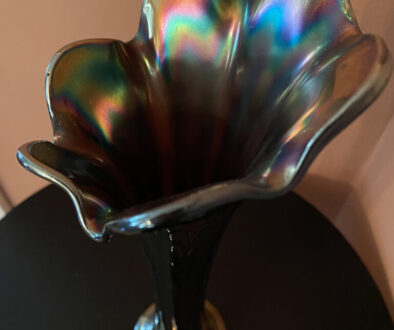Lights Out
The War Comes Home to America: U-boats off the Mid-Atlantic

Source: history.navy.mil
The waters off the mid-Atlantic were one of the most dangerous places on earth in the first few months of 1942. After Germany’s declaration of war against the United States on December 11, 1941, the head of the German U-boat arm, Admiral Karl Donitz, sent a handful of long-range submarines to attack shipping along the East Coast of the United States. The carnage they inflicted was out of proportion to their numbers, and ships went down all along the East Coast from New York to Florida, including off the coast of Cape May.
According to local news sources, military activities on the Jersey Cape accelerated. Aircraft observation posts were manned in Mayville, Erma, Swainton, Petersburg, Woodbine, and on top of the Ocean City Music Pier. Precautions against air attacks that might destroy the beachfront resorts absorbed Cape May County in the months following the Pearl Harbor attack.
At first, the county required only a dim-out of lights along the boardwalks and beachfront businesses and houses. After the sinking of the Varanger, an 8,510-ton Norwegian tanker, by a German submarine off the coast of Cape May County in January 1942, Naval authorities ordered a blackout of lights along the New Jersey coast. Blue lights were installed in the Cape May City High School, Convention Hall, and other public buildings. The blackout extended 10 miles inland. The U.S. Coast Guard and county authorities restricted fishing in local waters to avoid the mines reportedly laid by the Germans at the mouth of the Delaware Bay. County freeholders ordered all boats away from county bridges, fearing sabotage.
After the war it was learned that the Delaware Bay was a strategic target for the Germans because of its access to the Delaware River, where Philadelphia oil refineries and Dupont munitions factories were located. There were 18 ships sunk in and around the mouth of the Delaware, many within sight of land. It was not uncommon for people in Cape May to see the smoke or fire of a burning ship, and for tar balls—or bodies—to wash ashore.
How the United States, Cape May County, and American Admiral Ernest J. King dealt with the German U-boat menace, and the story of Germany’s warfare off the coast of Cape May, is the subject of this year’s annual Lessons of History Distinguished Lecture Series.
Cape May MAC (Museums + Arts + Culture) welcomes award-winning author and professor, distinguished historian, and acclaimed speaker Dr. Craig Symonds to present “The War Comes Home to America: U-boats off the Mid-Atlantic,” this fall as part of its annual Lessons of History Distinguished Lecture Series. This is the 12th lecture in the series, which brings top national historians to Cape May Convention Hall in October to speak on engaging topics of history and to share insights in a Q&A session with the audience.

Dr. Symonds taught history at the U.S. Naval Academy for 30 years and has earned numerous awards for his teaching and research. He is the author of 17 books translated into six languages and holds the Naval Historical Foundation Dudley Knox medal for lifetime achievement and the Pritzker Military Museum & Library Pritzker Prize for Lifetime Achievement in Military Writing. We sat down to talk about his upcoming lecture:
Krysiak: The title of your talk is The War Comes Home to America: U-boats off the Mid-Atlantic. It’s war. It’s America. It’s U-boats. It’s the Mid-Atlantic. There’s a lot to take in with these four words. What will your lecture focus on?
Symonds: Here’s the thing—in terms of wars that begin and end and are fought overseas, we were protected by these giant moats, the Atlantic and the Pacific. Wars that took place in Asia, wars that took place in Europe—we were separated from them, physically, by these oceans, and it gave us a powerful sense of security. We would get involved in those wars but sometimes not by our own choice. The Japanese attacked Pearl Harbor. That dragged us into one war. Other times it was wars of choice—we decided that going to Vietnam was something we should do to quash the Communist threat—but in either case and in every case, those moats were there to protect us.
K: Moats. I hadn’t thought of oceans in that way.
S: In late 1941, when Germany declared war on the United States and German submarines began appearing within a mile or two of the American coasts, suddenly, that reduced the size of that protective moat to something that was discernible, and a little bit terrifying.
K: I imagine what it was like to live on the Jersey Coast during World War II. It must have been unnerving. Frightening.
S: And it was hard for Americans to get used to, because orders went out that if you live along the coast, if you’re a coastal city, you should dim your lights at night so that U-boats off the coast can’t use those lights as background to target American ships. Americans thought, “Yeah, sure,” and left their peacetime lights burning. Because it just didn’t occur to us, as it did to every European, that we are in personal jeopardy of being affected by this war. So, the arrival of the U-boats off the coast, not only in New Jersey but all up and down the American East Coast, was kind of a terrifying moment.
K: Was it a wake-up call for Americans?
S: It was a little bit of a wake-up call. Pearl Harbor was a wake-up call. Our fleet was attacked by a foreign enemy on a Sunday morning by surprise. We were apparently stunned by it—not only physically unprepared at the point of attack, but emotionally unprepared for what that meant. We were suddenly vulnerable. So, the real wake-up call was Pearl Harbor. The fact that not only could German U-boats show up off the coast of the Atlantic, but Japanese submarines also surfaced off the coast of Santa Barbara and shelled the oil refineries in California! Oh my gosh! So, yeah, all of this was a bit of a wake-up call, and contributed to this sense that we now find somewhat nostalgic: that all Americans were pulling together. … Those who could fight, did, and those who couldn’t fight supported them—and boy, those days are gone, aren’t they.
Of course, it is particularly stark when you consider that up until about 1939, 1940, the dominant attitude in the United States was isolationism: “This has nothing to do with us, we don’t really care, that’s over there, it doesn’t affect us, it’s not our problem, we shouldn’t get involved.” There was a powerful sense that our involvement in World War I was a mistake.

I mean, what did we get out of that war? There were 50,000 killed and not much else. So, we’re never going to do that again (was the thinking). Then, Pearl Harbor and the German declaration of war happens, and suddenly it flipped, like a light switch.
K: Like a light switch. So, turning their lights out at night. People eventually came around to doing this.
S: More and more. It never became universal, because the ability of the United States to suppress the U-boat threat became strong enough in the Mid-Atlantic states that the German U-boats headed south. They went off the coast of Florida, and down particularly into the Caribbean. What they were targeting were oil tankers. They were after the oil tankers from Louisiana and East Texas [that were] bringing oil around Key West up to the refineries on the East Coast. So instead of attacking them off the coast of New Jersey, they were attacking them down in the Caribbean, where there was less defense. So, Americans did come around a bit to the idea that yes, we need to take this seriously—perhaps turn off our lights. But it never became universal the way that it did in London, where every resident in London would turn off all the lights or black out their windows.
K: You touched on shipping commerce. Were the U-boat attacks a sort of general mayhem, or was it a focused effort by the Germans to find and destroy commercial ships?
S: That’s a good question. The answer is both. The overall German strategy of the war at sea was to destroy as much shipping of all kinds as possible, so that’s the general mayhem category. Their notion was, if you destroy the shipping, it will become impossible for the United States—and Canada, too, by the way—to continue to supply Britain, particularly, of the raw materials she needed to sustain the war. So, sinking ships—full, empty, all kinds of every kind—was their primary goal. Along the American East Coast, oil tankers were the primary objective, because oil is the fuel of war. Back in the 1940s, no country could fight a war without oil, and the United States had more of it than anybody else. We’re used to thinking today of being dependent upon others for imported oil, Saudi Arabia, for example. But from 1941-45 we were the king of oil. We produced more than the rest of the world combined, and we sold it overseas at a nickel a barrel, as fast as we could pump it out of the ground. We had unlimited supplies of oil. If you could sink the oil tankers carrying it from Louisiana and Texas to the refineries, you could pinch off that oil supply, and that would make it difficult to sustain the war.
K: How did the American Navy defend against this? What was unique about our approach?
S: Well, this is a huge controversy, as a matter of fact. Because one of the great difficulties early on was a dearth, a scarcity, of escort ships to protect tankers, particularly getting around the Cape Hatteras headland in North Carolina. Because there weren’t enough escorts, the Navy decided they wouldn’t escort them at all. And that became extraordinarily controversial, with all the sinkings that took place in 1942, in particular. The man who made that decision was Navy Admiral Ernest J. King. He came in for a lot of criticism about that. That’s one of the things I’m going to talk about in this lecture.
K: I have read that he had an ill temper.
S: King was a confident man. He did not suffer fools. So, if you went before him and you weren’t sure what you were talking about, or you had some misinformation, there would be no sympathy or empathy on his part—he would toss you out of his office quicker than you could say Jack Robinson. Two quick stories. One is that his daughter once said of him, “My father is the most even-tempered man in the entire United States, because he is always in a rage.” The second one comes from Franklin Roosevelt, who admired, liked and, I think, needed Ernest J. King in charge of the Navy. He said once that King “shaves every morning with a blow torch.” That gives you some sense of the man.
K: He played an important role.
S: Critical. Absolutely critical [role]. Throughout the whole war. And, not just on this, on many things. He can be criticized for some of it as everyone can be for the things they’ve done in their lives.
K: What else will you talk about in your lecture?
S: The United States was engaged in a non-declared but nevertheless deadly war by the middle of 1940, a year and a half prior to 1941.
“The War Comes Home to America: U-boats off the Mid-Atlantic,” is Sunday, October 13 at 5pm at Cape May Convention Hall. For information call 609-884-5404 or visit capemaymac.org.



